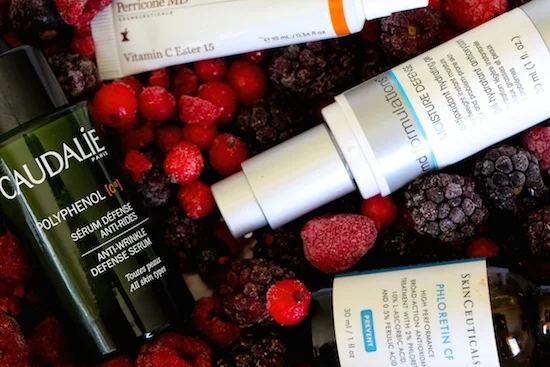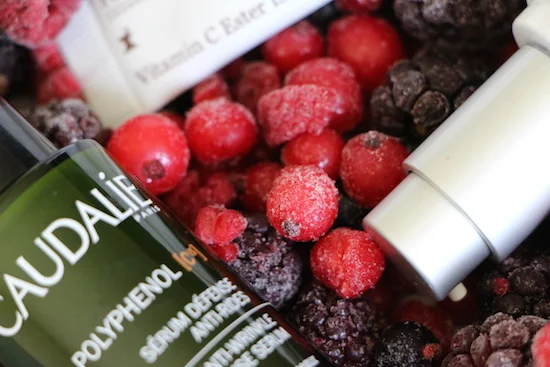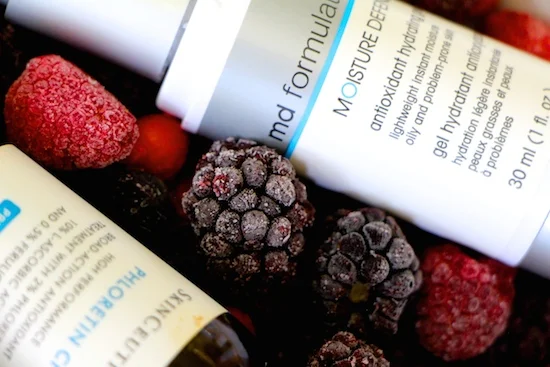
This post on antioxidants has been in my drafts folder since 2012 and, as I have a few skincare posts coming up that talk about antioxidants, I thought that I’d bite the bullet and get it finished off. I’ve even brightened up the page with some product shots that feature REAL BERRIES, so please take a few seconds to admire them. Ha. (I put the berries in a NutriBullet smoothie afterwards along with some spinach and Chia seeds and a bit of banana. Delicious.)
Antioxidants in skincare are substances that help to reduce the damaging effects that things like sun exposure, pollution and other environmental aggressors have on our skin. This damage is what starts to make us look older – it shows up as wrinkles and sun spots and patches of discolouration, or it starts to make the skin sag and look thinner and lifeless. In a nutshell: all of this damage isn’t good. The good news is that our cells contain antioxidants naturally and these help to neutralise this damage and keep it all in check, but the bad news is that quite often, the onslaught from things like smoking cigarettes and sitting outside in the midday sun can be too much for our natural defences. That’s when the real damage happens and that’s why a bit of an antioxidant boost (through food, though skincare) could help to limit the ongoing damage.
(I am keeping this brief and very simple so that I don’t bore the pants off people, but I have explained antioxidants and free radicals in what I hope is a little more detail here. There’s also a ridiculous analogy about a drunk man and a pub and a bar brawl, so do take a few minutes to do a bit of extra reading if you feel that way inclined! The additional post is here.)
What is an Antioxidant? The Most Inappropriate and Ridiculous Analogy Ever.
There are loads of different types of antioxidant – you’ll have heard of many of them, such as Vitamin C and Vitamin E, but there are long lists of them that might take you by surprise. Especially when you look at some of the foods that they are found in. Onions, anyone? Nuts? Not the kind of foods that I’d have immediately associated with antioxidants; personally I always used to think of blueberries and green tea and red wine! (There’s quite a nice list of antioxidants and the foods that they can be found in here.) At any rate, it goes without saying that the more varied and fresh your diet is, the more antioxidants you’ll consume.
But what about skincare? Again, you’ll no doubt have seen Vitamin C and Vitamin E being touted about on skincare packaging, but they are by no means the only topical antioxidants. Scientists are constantly coming up with new ways of using ingredients and combining them, of keeping them stable and making them more easily tolerated by the skin.

A good antioxidant serum or treatment is fast becoming a staple of my morning skincare routine. The general idea that I have cultivated over the past few years is that I “protect” with my serum in the daytime (followed by moisturiser and/or SPF) and then I “treat” with my serum and moisturiser at night. In terms of the antioxidant serum for day, I have about a million vitamin C ones that I’ve been testing an there are suggestions below, but my latest has been the very affordable one from Una Brennan Superfacialist. It’s called the Vitamin C Glow Boost Serum, £15.99 from Boots.com here.
Then at night, I apply my glycolic treatment or a hydrating serum or a nourishing oil, depending on what my skin is up to. I like a bit of glycolic action a few times a week to keep my skin buffed and fresh, otherwise it’s usually a serum like Advanced Night Repair followed by a moisturiser. A couple of times a week it will be an oil – either Argan or, most recently, the Sunday Riley Artemis.
The antioxidant step is not one of those steps that will always show an enormous amount of difference in the short-term, I think of it as more of an “investment” step. Saying that, you may very well see differences quite quickly; the repairing effects could have an impact on radiance, dark spots and even the plumpness and elasticity of the skin. Philosophy’s Miracle Worker Dark Spot Corrector fixed my dark acne scars over the course of about four months, and SkinCeuticals’ new Reveratrol B E (more on that later in the week) promises to improve firmness, radiance, elasticity and density, showing amazing clinical trial results at just twelve weeks. Both packed full of antioxidants. The results when using a good antioxidant might not be as instant as something like a glycolic peel or a brightening treatment, but the longer-term effects can’t be argued with. I’m religious about applying an antioxidant when I’m going on holiday – see as far back as my Decleor Serum use in 2011 – and I’ll always try to make sure that my little routine includes one sort or another, even if I’m trying out new things.

It’s not difficult to work an antioxidant into your routine – you’re probably using something containing antioxidants already. I find it easiest to use a day serum, as mentioned above – SkinCeuticals’ C E Ferulic is quite pricey but one of the best, if you’re serious about your skincare, I also love the aforementioned Miracle Worker, which shouldn’t just be limited to skin with dark spots to correct. It’s great as a general skin boost. See also Caudalie’s new and really quite excellent Polyphenol [C15} serum, which is at Escentual.com for £28 instead of £35 – a wonderful price for a top-quality serum, I think, and the Moisture Defense Antioxidant Hydrating Gel from MD Formulations. This is a moisturiser for oily skin that is so lightweight but gives a nice bit of hydration – I use it beneath my sunscreen. It’s £27 at LookFantastic here.
If you prefer a moisturiser then I can highly recommend Clinique’s Super Rescue Antioxidant Moisturiser (here), which is a night cream that I’ve bought again and again over the years. If you wanted an oil, then take a look at Neal’s Yard Remedies and their Argan Oil (£17.50 here) and also Pai Skincare’s Rosehip (£20 here). Both of these are very affordable, I think, considering the quality.
The others shown in the pics are Phloretin CF Gel from SkinCeuticals (see here) – supposedly better for those who can’t tolerate the CE Ferulic, which can be a bit hardcore, and Perricone MD’s Vitamin C Ester 15, which I haven’t given an extensive test – yet – but seems to get good reviews. A nice alternative to look out for, if you were after Vitamin C, is the C-Recover from Filorga. That’s £54 at M&S Beauty, here.
Phew! Now that I have this post to refer back to, I shall start on all of the antioxidant product reviews that are waiting in my drafts – I just wanted to get this big old mammoth of an explanatory tome out of the way. You can read previous posts on antioxidant products here – if you want to browse all of the skincare posts, please click here.
0 Comments